形容词+ly构成副词的规律PPT课件
- 格式:ppt
- 大小:106.50 KB
- 文档页数:5
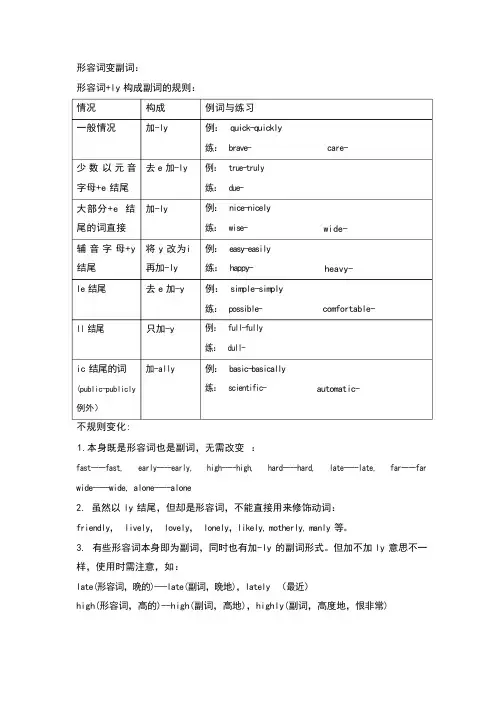
形容词变副词:形容词+ly 构成副词的规则:情况一般情况少数以元音字母+e 结尾大部分+e 结尾的词直接辅音字母+y 结尾le结尾ll结尾ic 结尾的词(public-publicly 例外)不规则变化: 构成加-ly去e加-ly加-ly将y 改为i再加-ly去e 加-y只加-y加-ally例词与练习例:quick-quickly练:brave-例:true-truly练:due-例:nice-nicely练:wise-例:easy-easily练:happy-例:simple-simply练:possible-例:full-fully练:dull-例:basic-basically练:scientific-care-wide-heavy-comfortable-automatic-1.本身既是形容词也是副词,无需改变:fast----fast,early----early,high----high,hard----hard,late----late,far----far wide----wide,alone----alone2. 虽然以ly 结尾,但却是形容词,不能直接用来修饰动词:friendly,lively,lovely,lonely,likely,motherly,manly等。
3. 有些形容词本身即为副词,同时也有加-ly 的副词形式。
但加不加ly 意思不一样,使用时需注意,如:late(形容词,晚的)---late(副词,晚地),lately(最近)high(形容词,高的)--high(副词,高地),highly(副词,高度地,恨非常)。
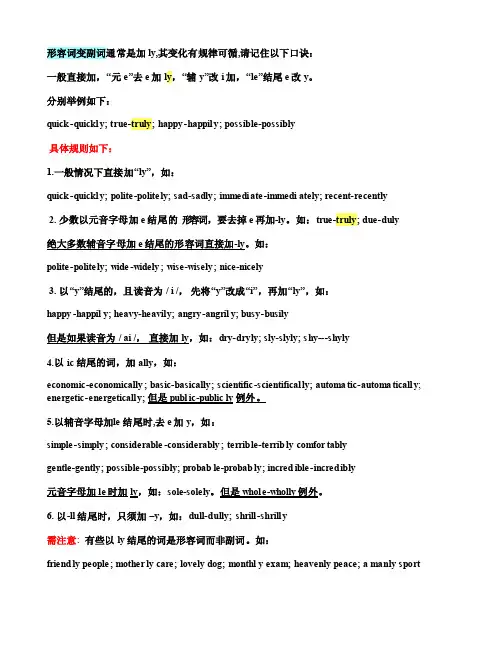
形容词变副词通常是加ly,其变化有规律可循,请记住以下口诀:一般直接加,“元e”去e加ly,“辅y”改i加,“le”结尾e改y。
分别举例如下:quick-quickly; true-truly;happy-happily; possibl e-possibl y具体规则如下:1.一般情况下直接加“ly”,如:quick-quickly;polite-politel y;sad-sadly;immedia te-immedia tely;recent-recentl y2.少数以元音字母加e结尾的形容词,要去掉e再加-ly。
如:true-truly; due-duly绝大多数辅音字母加e结尾的形容词直接加-ly。
如:polite-politel y;wide-widely;wise-wisely; nice-nicely3.以“y”结尾的,且读音为/ i /,先将“y”改成“i”,再加“ly”,如:happy-happily;heavy-heavily;angry-angrily;busy-busily但是如果读音为/ ai /,直接加ly,如:dry-dryly; sly-slyly;shy---shyly4.以ic结尾的词,加ally,如:economi c-economi cally;basic-basical ly;scienti fic-scienti ficall y;automat ic-automat ically; energet ic-energet ically; 但是publi c-publicl y例外。
5.以辅音字母加l e结尾时,去e加y,如:simple-simply;conside rable-conside rably;terribl e-terribl y comfort ablygentle-gently;possibl e-possibl y;probabl e-probabl y; incredi ble-incredi bly元音字母加le时加ly,如:sole-solely。


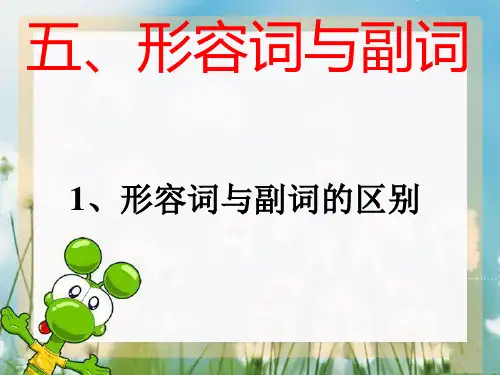

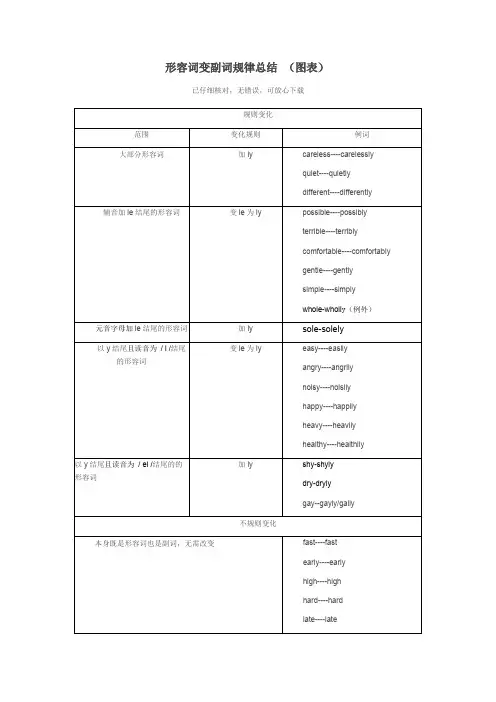
形容词变副词规律总结(图表)已仔细核对,无错误,可放心下载规则变化范围变化规则例词大部分形容词加ly careless----carelesslyquiet----quietlydifferent----differently 辅音加le结尾的形容词变le为ly possible----possiblyterrible----terriblycomfortable----comfortablygentle----gentlysimple----simplywhole-wholl y(例外)元音字母加le结尾的形容词加ly sole-solely以y结尾且读音为/ i /结尾的形容词变le为ly easy----easilyangry----angrilynoisy----noisilyhappy----happilyheavy----heavilyhealthy----healthily以y结尾且读音为/ ei /结尾的的形容词加ly shy-shylydry-drylygay--gayly/gaily 不规则变化本身既是形容词也是副词,无需改变fast----fastearly----earlyhigh----highhard----hardlate----latefar----farwide----widealone----alone 形容词和副词为完全不同的单词good----well 初中阶段唯一一个需要去掉字母e的单词true----truly虽然以ly结尾,但却是形容词,不能直接用来修饰动词friendlylivelylovelylonelyLikely有些形容词本身即为副词,同时也有加ly的副词形式。
但加不加ly意思不一样,使用时需注意wide(形容词,宽阔的,睁大的)----wide(副词,睁大地)/widely(副词,广泛地), late(形容词,晚的)-----late(副词,晚地),lately(最近)high(形容词,高的)----high(副词,高地)/highly(副词,高度地)特别容易犯错的副词形容词副词备注hard hard hard副词容易写成hardly, hardly意思为“几乎不”,与hard无任何关系friendly无不能用friendly直接修饰动词,只能改成in a friendly way“用一种友好的方式”。
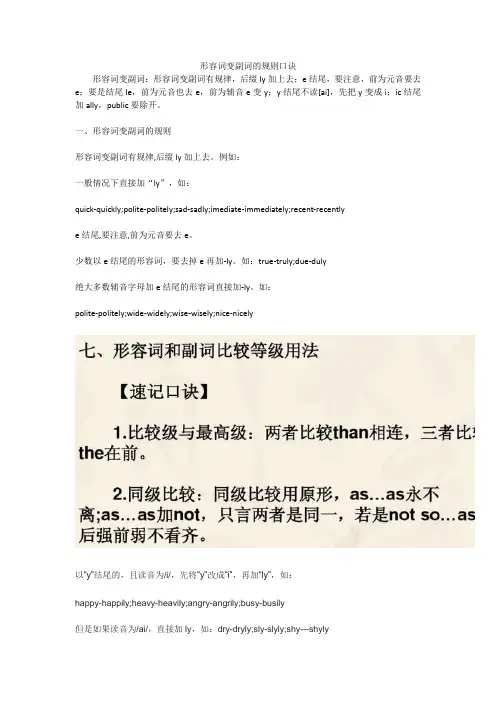
形容词变副词的规则口诀形容词变副词:形容词变副词有规律,后缀ly加上去;e结尾,要注意,前为元音要去e;要是结尾le,前为元音也去e,前为辅音e变y;y结尾不读[ai],先把y变成i;ic结尾加ally,public要除开。
一、形容词变副词的规则形容词变副词有规律,后缀ly加上去。
例如:一般情况下直接加“ly”,如:quick-quickly;polite-politely;sad-sadly;imediate-immediately;recent-recentlye结尾,要注意,前为元音要去e。
少数以e结尾的形容词,要去掉e再加-ly。
如:true-truly;due-duly绝大多数辅音字母加e结尾的形容词直接加-ly。
如:polite-politely;wide-widely;wise-wisely;nice-nicely以“y”结尾的,且读音为/i/,先将“y”改成“i”,再加“ly”,如:happy-happily;heavy-heavily;angry-angrily;busy-busily但是如果读音为/ai/,直接加ly,如:dry-dryly;sly-slyly;shy---shyly以ic结尾的词,加ally,如:economic-economically;basic-basically;scientific-scientifically;automatic-automatically;en ergetic-energetically;但是public-publicly例外。
二、形容词的定义形容词是说明人或事物的属性、状态或特征的词,在句子中主要作名词的装饰语。
形容词通常置于其修饰的名词之前,并且多数形容词具有比较等级。
描述形容词表示名词的性质、颜色、大小和状态等的形容词。
如:He bought some new books. 他买了一些新书。
These books are new. 这些书是新的。
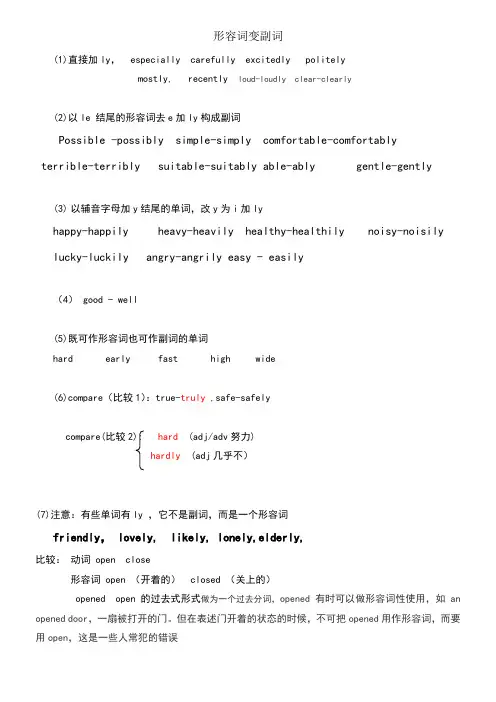
形容词变副词(1)直接加ly, especially carefully excitedly politelymostly, recently loud-loudly clear-clearly(2)以le 结尾的形容词去e加ly构成副词Possible -possibly simple-simply comfortable-comfortably terrible-terribly suitable-suitably able-ably gentle-gently(3) 以辅音字母加y结尾的单词,改y为i加lyhappy-happily heavy-heavily healthy-healthily noisy-noisily lucky-luckily angry-angrily easy - easily(4) good - well(5)既可作形容词也可作副词的单词hard early fast high wide(6)compare(比较1):true-truly ,safe-safelycompare(比较2): hard (adj/adv努力)hardly (adj几乎不)(7)注意:有些单词有ly ,它不是副词,而是一个形容词friendly, lovely, likely, lonely,elderly,比较:动词 open close形容词 open (开着的) closed (关上的)opened open的过去式形式做为一个过去分词,opened有时可以做形容词性使用,如an opened door,一扇被打开的门。
但在表述门开着的状态的时候,不可把opened用作形容词,而要用open,这是一些人常犯的错误名词变形容词的方法英语中,有时在名词之前或末尾加上不同的前缀或后缀就可以变为形容词。
如:sleep(睡觉)→asleep (睡着的)→sleepy (瞌睡的,困乏的), help(帮助)→helpful (有帮助的)等。

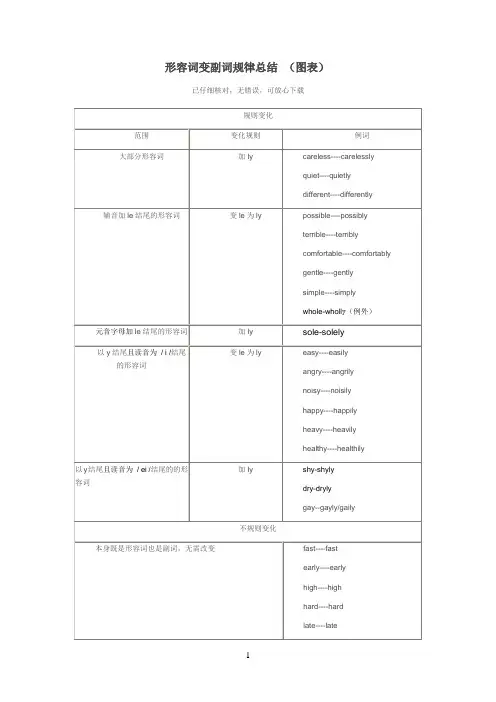
形容词变副词规律总结(图表)已仔细核对,无错误,可放心下载1. Mrs White smiled _____ ( happy) when she received a present from her daughter.2. Why do you think you did so ___________(terribe)in your test?3. We can __________(easy) forgive a child who is afraid of the dark, but we can’t forgivean adult who is afraid of the light.4. Congratulations! Y ou’ve answered all the questions _________(correct).5. The computer is ______( wide)used in our daily life. We can do many things with it.6. I changed into my sports shoes so that I could walk more ____________(comfortabe).7. Mary passed her examination because she studied very ________( hard ).8. “Why didn’t you tell me earlier?” The boss shouted _______(angry).9. It’s ___(true) possible that robot teachers will be popular in schools some day.10. How _________(comfortable) the giant pandas are living in Taiwan!11. Miss Xu smiled and said to me ________(soft), “Never mind, my boy!”12. Last night it rained __________(heavy) in the southern part of the city.13. Simon hates to be like others, he often tires to do everything ______(different).14. ----Where is Peter from? ----He is French, if I remember _________(correct).15. The children clapped their hands _________(excited) as soon as the astronauts appeared on the stage.16. Tom had an accident yesterday. His teacher sent him to the hospital ____(quick).17. We should speak to the old man _________(polite)18. I’m _______(true) sorry I can’t go with you. I have a lot to do this afternoon.19. Nancy is patient and she doesn’t give up ________(easy).20.His father was looking _____ (angry) at him because he had made a serious mistake.21.Mike walked _______(quiet) into the room not to wake up his grandpa.22. How _______(quick) Betty answered the teacher’s question!23. The firemen have saved the boy from the fire ____________(successful).Keys: 1. happily 2.terribly 3. easily 4. correctly 5. widely 6. comfortably7. hard 8. angrily 9. truly 10. comfortably 11. softly 12. heavily 13. differently14. correctly 15. excitedly 16. quickly 17. politely 18. truly 19. easily 20. angrily 21. quietly 22. quickly 23. successfully。
形容词变副词的变化规则(总1页)
--本页仅作为文档封面,使用时请直接删除即可--
--内页可以根据需求调整合适字体及大小--
形容词变副词:
形容词+ly构成副词的规则:
不规则变化:
1.本身既是形容词也是副词,无需改变:
fast----fast, early----early, high----high, hard----hard, late----late, far----far wide----wide, alone----alone
2. 虽然以ly结尾,但却是形容词,不能直接用来修饰动词:
friendly, lively, lovely, lonely,likely, motherly, manly等。
3. 有些形容词本身即为副词,同时也有加-ly的副词形式。
但加不加ly意思不一样,使用时需注意,如:
late(形容词,晚的)---late(副词,晚地),lately(最近)
high(形容词,高的)--high(副词,高地),highly(副词,高度地,恨非常)
2。